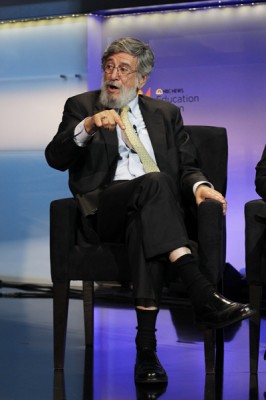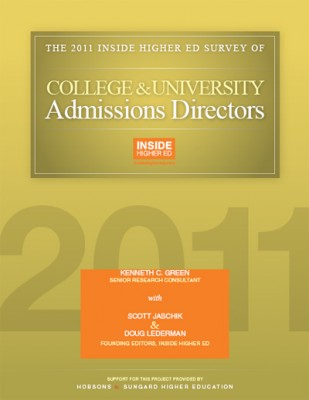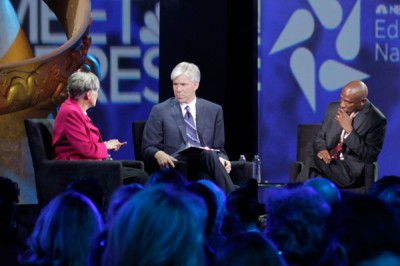Ravitch and Canada face off at Education Nation
The third day of Education Nation kicked off with a lively debate between charter school manager and educator Geoffrey Canada and education historian Diane Ravitch. Canada applauded the success of the charter schools in Harlem and elsewhere, with Ravitch countering that his schools and other charters had far more resources at their disposal than the average public school. Talk then branched into many of the public-private partnerships that some charters use. Canada, in his usual animated fashion, said he didn’t mind the private funding. He argued that private companies provide funds for new and potentially transformative ideas. “Education has no pressure to innovate whatsoever,” said Canada. Ravitch answered with a rejoinder that one in three charter schools, which have been given more freedom to experiment with curriculum and governance structure, perform worse than the local public school, and that most “have to clean up their act.”
In a later panel, Andrew Rotherham, a columnist at Time.com who also writes the widely read Eduwonk blog, referenced the part of the talk between Ravitch and Canada relating to private funding in charters. Only 12-13 percent of charters are privately managed, he said, calling that debate “silly.”
Elizabeth Green of GothamSchools, a website devoted to covering New York City public schools, said that all charters have the option to do things differently, defining them “as a system of schools, not a school system.”

Panel with, from left, Rehema Davis, Steven Brill, Nicholas Lemann, Andrew Rotherham and Elizabeth Green (photo by Nick Pandolfo)
A running theme through Education Nation’s panels has been a debunking of the argument that America’s education problems are financial. Many panelists said that the $650 billion education budget is one of the greatest in the world. “It’s outrageous that we can’t give our children a good education,” said Steven Brill, author of the new book Class Warfare. “And it’s not about money.”
Another popular talking point in multiple panels has been the lack of creativity in American schools as the focus on math, reading, and tests has increased. Harvard University president Drew Faust shared stories about a recent trip to China, when educators asked repeatedly about the humanities and liberal arts — something they see as missing in their institutions.
Teacher quality and assessment were again big focuses today. Here are some quotes from the day around this topic:
Diane Ravitch:
Comparing the American system to Finland, where she said education schools are highly competitive, she said of America: “People can get a teaching degree without ever seeing a student.”

Marc Tucker, president and CEO of The National Center on Education and the Economy (photo by Nick Pandolfo)
“You don’t assess [teachers] with tests … You have excellent principals and peer reviewers look at their work.”
“We have a teaching profession that’s not really even a profession.”
Geoffrey Canada:
“If there are lousy teachers, it’s because some lousy administrator hired them.”
“Some people cannot teach.”
Steven Brill:
“The one workplace in America where performance has never mattered is K-12 education.”
Marc Tucker, CEO and President of the National Center on Education and the Economy:
“Our teachers are treated like interchangeable parts.”
“We don’t expect them to bring high skills to the job.”
Other countries “would laugh at the idea that you can teach a teacher to teach in six weeks.”
Governors take stage at Education Nation
After lunch, a panel of 10 state governors sat down with Brian Williams to discuss the state of education in America. They spoke and took questions about a wide range of topics: from how to evaluate teachers to the the No Child Left Behind (NCLB) waivers that were announced by President Obama last Friday, to for-profit programs and partnerships taking place across the country. A point brought up multiple times by teachers during the day related to how teachers can share knowledge and experiences. A teacher from the audience said to the panel of governors, “We need to share best practices on a pedagogical level. How do you get best practices out there and share them?”
NBC was criticized by some for putting on a summit at last year’s Education Nation that was anti-teacher and pro-charter school, especially with the focus on the then-recently-released conversation starter Waiting for Superman. “It was all built around Waiting for Superman,” said Dennis Van Roekel, president of the National Education Association. “And this year it’s very different. I think the overall atmosphere is much more positive.”
The Hechinger Report sat down with president of NBC Steve Capus to ask him if that criticism had anything to do with the tone of this year’s summit being more positive and focused on teachers (NBC had cameras broadcasting live from three classrooms).
“I think we’ve got a broader, deeper agenda this year,” said Capus. “Last year was a snapshot of where the education space was focused. Superman was of that moment, the reform moment. Michelle Rhee was on the world stage — so we spent a lot of time talking about that. This year I think it’s a little bit different. Funding is a huge issue right now. The collision between states and the feds and states rights. Teacher quality continues to be a hot-button issue so you’re hearing a lot of discussion about that.”
NBC’s Education Nation focuses on teachers and early childhood Monday morning

Education Secretary Arne Duncan is interviewed by Ann Curry at Education Nation on Sept. 26, 2011. (Photo by Nick Pandolfo)
NBC’s big special on education — called Education Nation — is under way today.
Experts then presented research showing what is happening, in real time, inside a child’s brain as he or she is being spoken to or figuring out a puzzle. There was reiteration about how important it is to speak to and engage with young children. Dr. Patricia Kuhl said, “if someone tries to interrupt you while you’re talking to your baby, say ‘Stop, I’m building a brain here.’”
Dr. Elanna Yalow added that early childhood education programs often have teachers who are not certified. “We need to professionalize the field. This is not babysitting.” A panel including early education experts and Hollywood actress Jennifer Garner, an ambassador for Save the Children, concluded their talk with a conversation about making school year-round.
In Seretary of Education Arne Duncan’s talk with Tom Brokaw and Ann Curry, he rehashed what have been his driving points in recent appearances:
President Obama announces waiver plan for NCLB
“To help states, districts and schools that are ready to move forward with education reform, our administration will provide flexibility from the law in exchange for a real commitment to undertake change. The purpose is not to give states and districts a reprieve from accountability, but rather to unleash energy to improve our schools at the local level,” President Obama said.
The federal government released a fact sheet stating that to apply for a waiver, states must develop and submit plans aimed at improving student outcomes through: 1) college and career-ready standards; 2) systems of differentiated recognition, accountability and support; and 3) evaluating and supporting teacher and principal effectiveness. NCLB, signed into law with strong bipartisan support shortly after 9/11, is the latest incarnation of the Elementary and Secondary Education Act, which is supposed to be renewed every five years. It was due for re-authorization in 2007, but Congress has yet to reach agreement on reauthorizing it. Few experts see hope for a re-authorization before the 2012 presidential election.
Obama’s waiver plan has the support of some organizations that have previously called for a full rewrite of NCLB, including Education Trust, an organization focused on closing the achievement gap, which feels the plan strikes a nice balance between federal and state control.
Other groups, like Democrats for Education Reform, have expressed concern that the waivers could allow some states that haven’t shown much improvement to avoid accountability.
American Federation of Teachers president Randi Weingarten said that she feels the waivers don’t adequately address what is known about effective teacher-evaluation systems.
RiShawn Biddle, of Dropout Nation, writes that the waiver plan is a strong move away from accountability.
What’s your take — is the Obama administration’s plan for NCLB waivers a good idea?
Education in spotlight, briefly, at last night’s GOP debate
Last night’s debate among the leading candidates for the Republican presidential nomination marked the first time all were asked to comment on education. They had 30 seconds to respond to a question by teacher Stella Lohmann about what they’d do with the “massive overreach of big government into the classroom.” Predictably, answers dealt with scaling back the federal role in education and localizing educational decisions. Providing greater choice and parental control were also popular suggestions. Here’s a look at some of what was said, in the order in which candidates answered the question:
Gary Johnson: “The federal Department of Education gives each state 11 cents out of every dollar that every state spends, but it comes with 16 cents worth of strings attached. So what America does not understand is that it’s a negative to take federal money. Give it to 50 laboratories of innovation, the states, to improve on, and that’s what we’ll see: dramatic improvement.”
Rick Santorum: “At some point, we have – the government has convinced parents that at some point [the education of their children is] no longer their responsibility. And in fact, they force them, in many respects, to turn their children over to the public education system and wrest control from them and block them out of participation of that.”
Newt Gingrich: “I believe we’d be far better off if most states adopted a program of the equivalent of Pell Grants for K-through-12, so that parents could choose where their child went to school, whether it was public, or private, or home-schooling, and parents could be involved.”
Ron Paul: “The goal should be set to get the government out completely, but don’t enforce this law of No Child Left Behind. It’s not going to do any good, and nobody likes it. And there’s no value to it. The teachers don’t like it, and the students don’t like it.”
Rick Perry: “I happen to believe we ought to be promoting school choice all across this country. I think school — the voucher system, charter schools all across this country.”
Mitt Romney: “We looked at what drives good education in our state, what we found is the best thing for education is great teachers, hire the very best and brightest to be teachers, pay them properly, make sure that you have school choice, test your kids to see if they are meeting the standards that need to be met, and make sure that you put the parents in charge. And as president I will stand up to the national teachers unions.”
Michele Bachmann: “What I would do as president of the United States is pass the mother of all repeal bills on education. I would take the entire federal education law, repeal it. Then I would go over to the Department of Education, I’d turn off the lights, I would lock the door and I would send all the money back to the states and localities.”
Herman Cain: “All of the programs at the federal level where there’s strings attached, cut all the strings. We have got to encourage parents to take advantage of choices, but provide those choices and we must find ways to empower the students.”
Jon Huntsman: “We actually worked on early childhood literacy. If you can lock in the pillars of cognitive development around reading and math before age six, you are giving those kids the best gift possible as they then proceed through education.”
Survey: Colleges looking for students who can pay, some willing to lower standards
 With the economy still sagging, many colleges and universities are focusing on students who can afford to pay more of the costs of attending, according to a survey by Inside Higher Ed.
With the economy still sagging, many colleges and universities are focusing on students who can afford to pay more of the costs of attending, according to a survey by Inside Higher Ed.
The survey, which was released Wednesday morning, included responses from more than 450 admissions officials at colleges and universities. One of the key areas the survey focused on was the various recruiting strategies colleges and universities say they’re planning to use for the next several years.
The most popular recruiting strategy among four-year schools is to focus on enrolling more out-of-state students, presumably because they tend to pay higher tuition than in-state students. Another popular strategy is to target international students as well, who also typically pay higher fees.
Public universities and colleges, faced with shrinking government aid, are also specifically focused on recruiting “full-pay” students, who don’t require student aid, according to the survey.
Perhaps more disturbing, some officials said they are lowering standards for students who can pay more. One in 10 admissions officials at four-year schools said they are admitting “full-pay” students who have lower grades and test scores than other applicants.
Roughly one in four admissions officials surveyed said they’ve felt pressure from administrators or trustees to admit specific applicants, according to the survey.
Check out the full report for more information.
Finalist from last year wins the 2011 Broad Prize for Urban Education

Charlotte-Mecklenburg Schools representatives, with Eli Broad, U.S. Secretary of Education Arne Duncan and John Legend (Photo by Broad Foundation)
Calling the Charlotte-Mecklenburg Schools “a model for innovation in urban education,” U.S. Secretary of Arne Duncan announced the North Carolina district today as the 2011 winner of the Broad Prize for Urban Education.
Duncan highlighted Charlotte-Mecklenburg’s success in narrowing achievement gaps faster than any other district in North Carolina, and noted that it has begun sending the district’s best teachers to its most struggling schools.
The Eli and Edythe Broad Foundation, which will give Charlotte-Mecklenburg $550,000 toward college scholarships for high-school seniors, said that the district — a finalist twice before, in 2004 and 2010 — won in part because it reduced the achievement gap in high-school reading between African-American and white students by 11 percentage points from 2007 to 2010. Also, sixty-two percent of the district’s African-American seniors took the SAT this past school year, the highest percentage among all 75 urban school districts eligible for the prize.
But Charlotte-Mecklenburg has had its share of struggles between the April announcement of the four finalists, which included Broward and Miami-Dade Counties in Florida and the Ysleta District in El Paso, and today’s prize.
Reports in July said that Charlotte-Mecklenburg failed dismally in meeting its academic targets for the 2010-2011 school year. Emily Dalesio of the Associated Press wrote on July 21 that “preliminary schoolhouse data show fewer than three of 10 Charlotte-Mecklenburg Schools met the targets set for them in the academic year that concluded in June.”
And in June, Newsweek’s list of America’s Best High Schools had only two Charlotte schools on it, down from 13 last year. (Newsweek used stricter criteria this year, which might help explain the drop.)
This all came shortly after Charlotte-Mecklenburg superintendent Peter Gorman — who oversaw the district’s upward climb — left for a position in the News Corp.’s newly minted Education Division.
Charlotte was the birthplace of mandated desegregation busing in 1969, which lasted until 2001 and yielded largely positive results.
The three runners-up — each of which has been a finalist before — will receive $150,000 in scholarship money for their seniors. Highlights from these districts:
— In Broward, the achievement gap in reading and math was “near the smallest in Florida,” according to Duncan.
— In Miami-Dade, Duncan applauded its “online data warehouse,” where “data is the basis for every conversation.”
— In the Ysleta district, located on the Texas-Mexico border, 84 percent of all seniors took the SAT, the highest of the 75 districts eligible for the prize. Schools there also pay for students to take the PSAT and begin talks with parents about the SAT when their children are in sixth grade.
Federal government launches ‘Digital Promise’ to foster new educational technologies
Do U.S. schools need an infusion of digital technology to transform teaching and learning? A new nonprofit center known as “Digital Promise” thinks so, and it will help fund the development of new technology like learning software and educational games in schools across the country. The center, created by Congress and launched on Friday, hopes to make it easier for public and private companies to pilot digital-centered curricula in classrooms. It was founded, according to its website, “to spur breakthrough technologies that can help transform the way teachers teach and students learn.”
U.S. Congressman John Yarmuth (D-KY) — a major force in bringing Digital Promise to life — introduced the new center at the White House on September 15th, where U.S. Secretary of Education Arne Duncan shared details on technological advancements in other countries.
South Korea, for example, is committed to having no textbooks in classrooms by 2015. In Uruguay, there is a laptop for every student, said Duncan, who posed the question, “Will the United States lead or lag behind?”
Duncan and others highlighted digital successes in North Carolina and New York City, and other speakers described a move toward a competency-based learning environment enhanced by technology rather than a time-based one, which plans lessons based on hours of instruction, not students’ level of understanding.
It’s a concept that Michael Horn — founder of Innosight Institute and a contributor to Forbes.com — agrees with.
Digital Promise comes into being at a time when increased spending on educational technologies is under scrutiny. A front-page article earlier this month in The New York Times described how scores on standardized tests have remained flat in digital classrooms, on average, despite in many cases an investment of millions of dollars. The story caused a stir in the education policy world, and renewed the discussion about technology’s potential to transform teaching and learning.
John Merrow, president of Learning Matters and education correspondent for the PBS NewsHour, said teachers must know how to use technology to enrich students’ learning experiences. Merrow went on to suggest that the $10-12 billion a year that the country spends on technology in schools is largely wasted, in large part because of “unimaginative uses of the technology, essentially digital versions of routine stuff.”
Among other activities, Digital Promise will form partnerships with entrepreneurial start-ups that are developing educational software. For example, video-game company Valve Corp. will create educational video-game competitions in physics.
Funders for Digital Promise include the U.S. Department of Education, the Carnegie Corporation and the William and Flora Hewlett Foundation. (Disclosure: the Carnegie Corporation is among The Hechinger Report‘s current funders, and the William and Flora Hewlett Foundation is among the Hechinger Institute’s past funders.)
At the event launching Digital Promise, the National Science Foundation also announced its first round of winners for $15 million in grants as part of its “Cyberlearning: Transforming Education” program.
The Hechinger Report is interested in hearing more views on the growing digital debate in education. In what ways can technology improve teaching and learning?
School districts’ views on the Common Core State Standards
Yesterday, the Center on Education Policy released survey results that detail the views of school districts on the Common Core State Standards in the states that have adopted them so far. The Common Core is a push to standardize K-12 learning expectations across the nation–a break from the long tradition of local control in American schools–and to ensure that high-school students are better prepared for college and careers.
About 60 percent of the districts surveyed in the 43 states and Washington, D.C. that had adopted the Common Core when the survey was conducted say the new standards are more rigorous than what was previously in place, according to the Center on Education Policy. Two-thirds of districts surveyed report having begun to develop implementation plans and timelines, or the intention to develop such plans during the current school year.
However, more than three-quarters of districts expressed serious concerns about whether there will be adequate funding for all elements of the Common Core, and two-thirds said they’ve received inadequate or unclear guidance from their states about how to proceed.
If these hurdles can be cleared, however, the districts believe the changes will be welcomed by parents, community members and educators. Only 10 percent of districts said they anticipate resistance from principals and teachers being a major challenge in implementing the Common Core. Fifty-eight percent see such potential resistance as a minor challenge.
If you live in a state that has adopted the Common Core, what are your thoughts about it so far?
More students defaulting on college loans
Another sign of America’s struggling economy revealed itself yesterday when the U.S. Department of Education released figures indicating that the percentage of people defaulting on college loans rose from 7.0 percent in 2008 to 8.8 percent in 2009. The for-profit sector of higher education–which has come under scrutiny for aggressive recruiting tactics in low-income areas–accounts for a disproportionate number of the defaults. Of 3.6 million loans issued, just under 9 percent, or 320,000, were defaulted on, raising further concerns about the spiraling costs of higher education and the general public’s knowledge of the potential financial burden.
In an effort to raise awareness and create transparency, the Department also released a list that details college tuition rates and how quickly they’re increasing, and says it will soon disclose more data, such as gainful employment figures.




